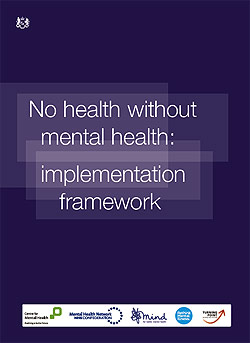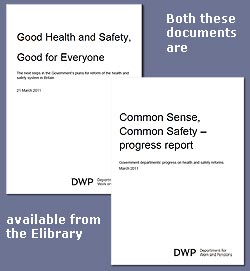Government Strategy On Improving Mental Health Wellbeing And Removing Stigma Published
Following months of meetings with Mental Health charities, employers, and NHS mental health clinicians, the Government yesterday issued a press release to publicise its strategy to tackle the stigma around those suffering mental health problems, and the disparity within the NHS in treatments between mental and physical illnesses. It also specifically challenges employers attitudes toward mental health wellbeing in the workplace and their response to employees suffering from mental health illnesses.
Five of the UK’s five leading mental health organisations – Mind, Rethink Mental Illness, Turning Point, Centre for Mental Health and the NHS Confederation’s Mental Health Network – have worked in partnership with the government to draw up the plans.
 But glaringly obvious by its absence is any mention of the words, ‘work related stress’, nor is there any reference to workplace pressures or to preventative action that can be taken by the employer.
But glaringly obvious by its absence is any mention of the words, ‘work related stress’, nor is there any reference to workplace pressures or to preventative action that can be taken by the employer.
At the launch event, Deputy Prime Minister Nick Clegg called upon employers to take three simple steps to improve the mental health of their staff, and urged everyone in society to play their part in reducing stigma.
He introduced the ‘Implementation Framework’ plans which bring together front line mental health workers, charities, organisations and academics working to improve the nation’s mental health. The plans are for improving mental health and stigma aimed for the first time at employers, schools, local councils, housing organisations and voluntary groups as well as more traditional organisations in the health and care sector.
In doing so, statistical evidence long quoted by Trade Unions campaigning for better treatment in healthcare for people suffering from mental health issues; and in their campaigns to try to get UK employers to address stress at work, monitor the mental health of their employees, as well as addressing the appalling lack of support around mental health illnesses; that generally workers experience at work.
The government’s press release states:
“Mental ill-health, such as depression and anxiety, costs British businesses over £1000 per employee every year, or almost £30 billion across the UK economy. This is mostly in lost production through staff being off work or under performing at work. The wider economic costs of mental illness in England have been estimated at £105.2 billion each year. This includes direct costs of services, lost productivity at work and reduced quality of life.
Right now, one worker in six has a mental health problem – almost 5 million of Britain’s 29 million workers.“
The ‘Implementation Framework’ sets out what employers, schools, businesses, local councils, housing organisations, voluntary groups and health and care organisations can do to promote good mental health, whether it be NHS clinical commissioning groups appointing mental health leads, schools developing awareness programmes to help staff recognise pupils at risk, or employers supporting the mental health of their workforce.
Deputy Prime Minister, Nick Clegg said:
“Today I am calling on every employer large and small to do a mental health stock take. Too many people suffer in silence with mental health issues. Employers are well placed to recognise warning signs and signpost their staff to support.
70 million working days are lost as a result of mental health issues every year, costing business £1000 every year for each employee. Managing mental health at work well can save around 30 per cent of these costs – businesses cannot afford not to take mental health seriously.
Companies such as BT, E.On, Deloitte and EDF Energy are already doing fantastic work to support their teams.”
Nowhere in the framework document or advice document referred to in the press release, does it mention that including the Trade Unions or employees representatives is best practice by the employer when devising policies and procedures with regard to the monitoring, identifying of and responding to, mental health wellbeing issues in the workplace.
Nor is there any mention of the health implications of work related stress. As a report in 2010 by the British Academy pointed out: "....... there is now
very consistent evidence that work stress has severe implications
for employee health. It not only increases anxiety and
depression but it leads to an estimated 50% increase in the risk
of heart disease."
 Further, no mention is made of carrying out risk assessments when designing jobs and attendance patterns, not to mention workflow management and the ability of the workers to manage and determine the rate and intensity of the work; in order to minimise the risk of stress to company workers.
Further, no mention is made of carrying out risk assessments when designing jobs and attendance patterns, not to mention workflow management and the ability of the workers to manage and determine the rate and intensity of the work; in order to minimise the risk of stress to company workers.
In the three steps that the government are urging employers to take to tackle the issues again, no mention is made of Trade Unions and the valuable part they play:
“To improve the health of employees and reduce unnecessary costs to businesses in lost productivity, managers and colleagues can all make a difference with these three simple steps:
1) Make this year the Time to Change: Sign your company up to the Time to Change campaign to end mental health discrimination. By signing up, you make a public commitment from the top of the organisation to the bottom, send a strong message to employees, and get expert support from Time to Change in dealing with mental health issues at work.
2) Get some ‘First Aid’ training in mental health: Most companies have an employee trained in first aid. But mental ill health is the most prevalent cause of illness among people of working age. Appointing someone as a mental health expert or training a number of people in awareness would make a huge difference. Training is available from a variety of organisations.
3) Call for help: the Health for Work Adviceline in England can be accessed on 0800 0 77 88 44 and www.health4work.nhs.uk. It is designed to support employers and employees in small and medium sized businesses, by providing free-to-use early and easy access to professional occupational health and well-being advice to help employees remain in or return to work after a period of ill health.”
Given the Government’s attacks on Health and Safety legislation and their stance that the majority of workplaces are ‘low risk’, and that enforcement of legislation and workplace inspections is both unnecessary and a burden on employers; their statement regarding mental health policies within the workplace completely contradicts that view and makes a mockery of the policy of decreasing enforcement by the HSE:
“A 2010 survey found that 72% of workplaces still had no formal mental health policy, and 23% of managers were unable to name a single mental health condition. By following these simple tips, and making information available to employees, managers can take steps to support their team.”
 But what is also misleading and immoral, is the Dept of Health’s deliberate failure to mention where employers whose
partnership with their Trade Unions is key to the successful development and implementation of their internal mental health wellbeing strategies.
But what is also misleading and immoral, is the Dept of Health’s deliberate failure to mention where employers whose
partnership with their Trade Unions is key to the successful development and implementation of their internal mental health wellbeing strategies.
Providing case histories from major companies including BT, which informed the Government’s mental health wellbeing strategy document, the Department of Health states in its press release:
“BT has reported that its mental wellbeing strategy has led to a reduction of 30% in mental health-related sickness absence, and a return to work rate of 75% for people absent for more than six months.”
Whether by design or by neglect, once again the Government praises businesses for their health and safety policies, procedures and campaigns whilst at the same time neglecting to mention that, as in the case of BT with the CWU; many Trade unions play a massive and key role within the companies their members are employed on the development of health and safety strategies within the companies concerned.
Whilst it is conceivable, and given the Tory-led coalition government’s attitude toward the Trade union Movement, is that had BT mentioned its partnership with the CWU on health and safety policies and strategies in their case history information, the Dept of Health press release would have made no mention of that fact.
However, given that we are unaware of exactly what BT told the Dept of Health, we will never know the answer to that. Suffice to say that previous articles in the media on health and safety within BT has failed to mention CWU’s involvement.
What we do know is what the Dept of Health press release says of the BT approach to stress:
"BT – three-pronged approach
- BT take a strategic approach to Health, Safety and Wellbeing and have developed a three-tiered mental health framework as part of this.
- Level one focuses on promoting employee wellbeing and preventing mental distress, for example through tips on the intranet and management training around softer skills.
- Level two is an initiative to identify distress and intervene early to prevent it from escalating, through an online stress risk assessment for employees and companion training for line managers about how to respond to people’s results.
- Level three includes a range of support and treatments for people experiencing mental health problems. Employees are encouraged to work with their line manager to produce an ‘advance directive’, to identify early warning signs and establish a plan of action for if they become distressed.
- BT’s focused approach has proved to be very successful, with one line of business where a more specific mental health policy was implemented seeing stress and anxiety sick leave fall by 24%.
- A new development has been the launch of a cognitive behavioural therapy service for staff experiencing mild-to-moderate mental health problems that do not need to have been diagnosed by a doctor. Line managers can refer employees to occupational health, who can then decide whether CBT would be appropriate and, if so, what type. This has been used by around 200 people and satisfaction rates have been very high."
Absolutely no mention of the CWU's part in this. It must also be remembered that the company's Workfit programme regarding stress was a total failure in terms of management's resourcing of the programme and as such, if it were not for the level of CWU resources and that of the charity Mind that went into it; the programme would not have gotten off the ground.
 NW BTU Health and Safety Co-ord Chairperson, Derek Maylor expressed his concern at the Dept of Health’s press release referral to BT’s mental wellbeing strategy whilst ignoring the partnership approach of the CWU in both developing and promoting the strategy within the company. In his email to co-ord members highlighting the Dept of Health press release, he wrote:
NW BTU Health and Safety Co-ord Chairperson, Derek Maylor expressed his concern at the Dept of Health’s press release referral to BT’s mental wellbeing strategy whilst ignoring the partnership approach of the CWU in both developing and promoting the strategy within the company. In his email to co-ord members highlighting the Dept of Health press release, he wrote:
“BT get a good write up here from this Government report, although disappointing no mention of CWU nor partnership approach.”
Chris Ingram, web editor of Unionsafety said that this is not the first time that credit to the CWU’s partnership approach to health and safety within BT was absent from publicity and evidence documentation. He added:
“As many of the CWU’s safety reps and branch safety officers will remember, if it were not for the union’s conference derived policies and years of lobbying the company, on the subject of work related stress and company attitudes toward mental health issues, including industrial action on management style which was identified by the union as one of the major causes of stress within BT call centres; BT would have no policies and programmes concerned with the mental health wellbeing of its employees as it refused for many years to recognise that the working environment and job pressures had any effect on its workforce’s mental wellbeing; claiming as it did that stress was caused by the individuals home-life alone! “
The 'Health Implementation Framework' document, its executive summary, and advice document for employers can be downloaded from the E-Library database using the key word ‘mind’.
Source: Dept Of Health / Derek Maylor / Unionsafety





 NW BTU Health and Safety Co-ord Chairperson, Derek Maylor expressed his concern at the Dept of Health’s press release referral to BT’s mental wellbeing strategy whilst ignoring the partnership approach of the CWU in both developing and promoting the strategy within the company. In his email to co-ord members highlighting the Dept of Health press release, he wrote:
NW BTU Health and Safety Co-ord Chairperson, Derek Maylor expressed his concern at the Dept of Health’s press release referral to BT’s mental wellbeing strategy whilst ignoring the partnership approach of the CWU in both developing and promoting the strategy within the company. In his email to co-ord members highlighting the Dept of Health press release, he wrote: